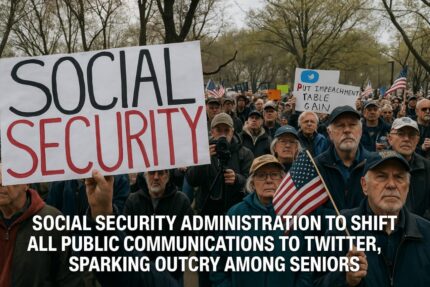In a sweeping new policy shift, the Social Security Administration (SSA) under the Trump administration will begin communicating exclusively through Elon Musk’s social media platform, Twitter, within the next three months. According to internal documents obtained by Wire, all traditional forms of communication—including mailers, emails, and updates on the Social security administration official website—will be phased out in favor of announcements, alerts, and updates posted solely on Twitter.
The move is part of a broader effort by the Trump administration to modernize government communication and streamline public service messaging. However, critics argue that the change is ill-suited to the Social security administration primary beneficiaries: senior citizens, most of whom are either unfamiliar with Twitter or have no presence on the platform. With roughly 67 million Americans relying on Social Security benefits, the potential fallout from such a shift could be substantial.
Elon Musk’s Role in the Transformation of Social Security Administration!
At the center of this transformation is tech billionaire Elon Musk, who reportedly proposed the idea as part of his broader initiative to integrate key public services into the Twitter ecosystem. Musk, who acquired Twitter in 2022 and rebranded it to “X,” has been lobbying federal agencies to use the platform more extensively for public engagement. The Social security administration is the first major federal agency to fully comply.
Musk’s involvement has raised eyebrows, especially given his controversial management style and the growing politicization of the platform. Critics fear that consolidating a government agency’s communication into a privately-owned, commercially-driven platform could jeopardize transparency, neutrality, and accessibility. While Musk has promised to offer dedicated tools and accessibility features for senior users, there remains widespread skepticism about their effectiveness and implementation.
Concerns Mount Over Elderly Americans Being Left Behind
The policy has sparked serious concerns from advocacy groups and lawmakers who argue that millions of elderly Americans could be effectively cut off from vital information regarding their benefits. Studies show that only a small percentage of Americans over the age of 65 use Twitter regularly, and an even smaller number rely on it as a primary source of news or official communication.
“This move borders on absurd,” said Sheila Branson, director of the National Coalition for Senior Rights. “You’re asking seniors—many of whom are dealing with disabilities, cognitive decline, or lack of digital literacy—to rely on a fast-moving, algorithm-driven social media platform to learn whether their benefits have been approved or delayed.” Advocacy groups are calling for urgent congressional hearings and demanding that the Social security administration offer alternative channels of communication to avoid what some are calling a “digital disenfranchisement” of America’s elderly population.
Government Defends Moves in social security administration as ‘Innovation for the Future’
Despite the backlash, officials within the Trump administration are defending the policy as an innovation aimed at efficiency and cost-effectiveness. In a statement released on Twitter itself, Social security administration Dr Administrator Andrew Renner said, “This transition will reduce administrative costs by 70%, allow for real-time communication with beneficiaries, and align the agency with 21st-century expectations.”
Administration officials argue that the transition period will include a comprehensive education and onboarding program to assist elderly users in creating and navigating Twitter accounts. They have also proposed collaboration with community centers and local libraries to provide digital literacy training for seniors. However, these reassurances have done little to ease fears, particularly among rural and low-income seniors who may lack reliable internet access altogether.
Political and Legal Challenges on the Horizon
The decision is already fueling political debate, with several Democratic lawmakers vowing to challenge the move in Congress. Senator Elizabeth Warren condemned the plan, calling it “an egregious abdication of duty to the most vulnerable citizens in our country.” She and others are preparing legislation that would bar federal agencies from making any platform their exclusive mode of communication unless accessibility standards are met.
Legal experts are also warning that the policy could run afoul of federal regulations requiring equitable access to government services. “A unilateral shift to a private platform raises serious constitutional and administrative law questions,” said legal analyst Mark Feldman. “If seniors are denied access to critical benefits information because they don’t have Twitter accounts, the government could face a slew of lawsuits.”
As the countdown to implementation begins, the nation watches closely to see whether this social media experiment will bridge the gap between government and its citizens—or deepen the digital divide.














